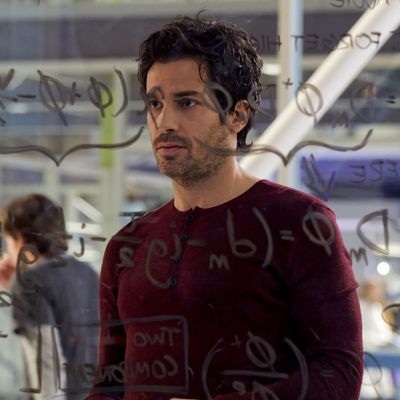
The summer science-fiction ÔÇ£eventÔÇØ┬áSalvation, which starts┬átonight┬áon CBS, is oddly out-of-step with the rest of scripted television. Rather than back up the assertion that TV can do almost anything that theatrical films once did, it reminds you that there are some things that TV probably shouldnÔÇÖt attempt, unless the people running the show have (a) oodles of money to throw at the screen, and (b) formidable storytelling chops.
Salvation, a series about scientists and military people trying to prevent an asteroid from wiping out humanity, obviously lacks (a) and seems fairly deficient in (b) as well. ItÔÇÖs a rinky-dinky answer to a couple of films that were big 20 years ago,┬áArmageddon┬áand┬áDeep Impact. Both were about extinction-level threats: In the first movie, it was an asteroid ÔÇ£the size of Texas, Mr. President,ÔÇØ to quote Billy Bob ThorntonÔÇÖs memorable formulation, while in the second movie it was a comet that was supposed to send us all to dinosaurland. Lacking the exuberant trashiness of the former film and the earnest sentiment of the latter,┬áSalvation┬ácontents itself with herding a bunch of great-looking but bland people into rooms filled with monitors, as well as hallways equipped with retinal scanners and the like, then has them squabble about how best to stop the giant rock tumbling toward Earth, with occasional interludes where they talk about their personal problems, which somehow manage to be less interesting than the ones that got sandwiched into the main plots of┬áArmageddon┬áand┬áDeep Impact.
Occasionally we get a field trip to the outdoors, or into space, as our heroes use elbow grease and can-do determination to try to stop the asteroid, nicknamed Samson. Problem is, you canÔÇÖt nuke the damned thing, because that would only tear it apart into lots of smaller rocks that would cause just as much damage, but in more places. No, we have to deflect it with a ÔÇ£gravity tractor,ÔÇØ which looks a bit like a scale model of a satellite from the 1970s. An opening sequence re-creating the real-life damage caused by the 2013 Chelyabinsk meteor incident in Russia illustrates the gravity, pun intended, of SamsonÔÇÖs threat. Salvation gets into the nitty-gritty portion of the tale only after a counterproductive lead-up, in which MIT grad student Liam Cole (Charlie Rowe) figures out whatÔÇÖs going on, then brings his findings to tech guru Darius Tanz (Santiago Cabrera), only to trigger an NSA panic that brings both men and their colleagues into government custody, where they learn that the government, represented by Pentagon information officer Grace Barrows (Jennifer Finnigan), is already working on the problem. IÔÇÖm honestly not sure why we needed to see other people figuring out a problem that the authorities were already well aware of, and that we viewers were aware of before any of the characters (because why would we even be watching this if we didnÔÇÖt know it was about a killer asteroid?). But thatÔÇÖs the mentality of this series, which expends prodigious energy on everything except what you actually want out of a project like this: cool problem-solving and fiery destruction.
There isnÔÇÖt a single memorable performance anywhere in Salvation, although, to be fair to the cast, with a script this perfunctory, escaping with oneÔÇÖs dignity intact is job no. 1 anyway. There is no direction to speak of, just shots of people saying lines, all cut together as chaotically as possible, the better to suggest ÔÇ£excitementÔÇØ that the mini-series itself canÔÇÖt generate. The most entertaining performance is by astrophysicist Neil deGrasse Tyson, who goes on a fictionalized news channel to plea for early detection systems thatÔÇÖll identify rogue asteroids more quickly, because if a giant rock is out there waiting to splinter our planet and wipe out civilization, ÔÇ£We just wonÔÇÖt even know it until itÔÇÖs too late.ÔÇØ As Tyson says that last phrase, his eyes widen in an almost pleading way, as if heÔÇÖs realizing how bad this whole enterprise is, and what a terrible idea it was to lend his name to it. Perhaps we should pay for early detection systems to warn famous scientists not to play themselves on TV.


